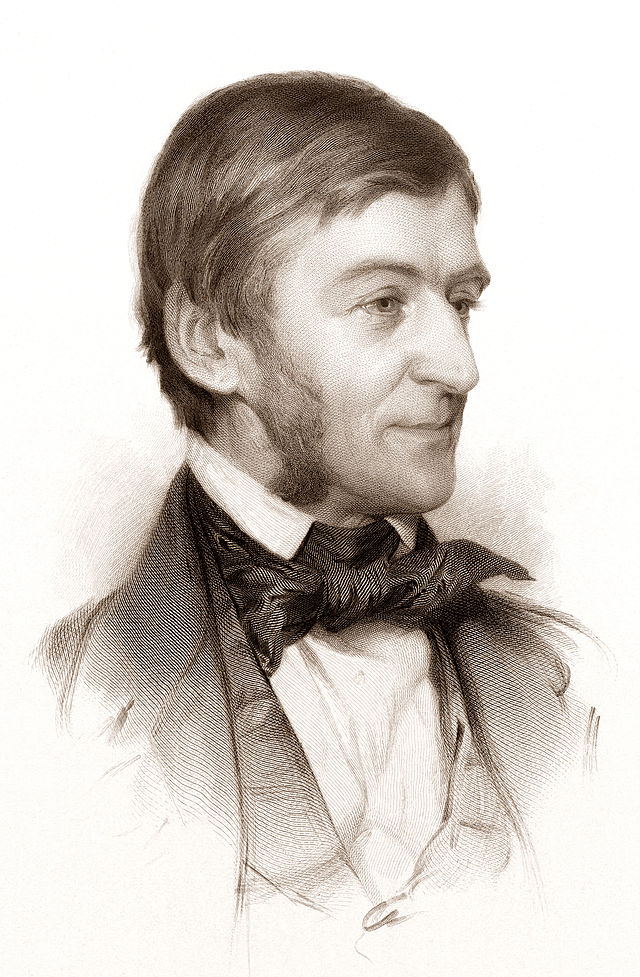
A stroll down memory lane towards a new endeavor
14 Jan 2015, by in Books, Travels, Unkategorisiert
R. W. Emerson, Stich von S. A. Schoff (1878)
In the course of preparing this website I picked up my old copy of Emerson’s essays[1]; I remembered that I had quoted his essay in my personal statement in applications to graduate school, and I thought that I might be able to use the quote somewhere on the site.
I wasn’t quite prepared for the trip down memory lane and the feelings of nostalgia that holding the book in my hand aroused. There was a postcard stuck between the pages, an image of Pompeii, and among the many underlined passages in the book, the following, in Emerson’s essay on self-reliance: “Travelling is a fool’s paradise. Our first journeys discover to us the indifference of places. At home I dream that at Naples, at Rome, I can be intoxicated with beauty and lose my sadness. I pack my trunk, embrace my friends, embark on the sea and at last wake up in Naples, and there beside me is the stern fact, the sad self, unrelenting, identical, that I fled from. I see the Vatican and the palaces. I affect to be intoxicated with sights and suggestions, but I am not intoxicated. My giant goes with me wherever I go.”[2]
In the margin I had noted: “25.03.02: read on the train from Naples to Rome!” (N.B.: Apparently I had already adopted the European dating system!)
While Emerson is certainly correct that we cannot escape our ghosts by fleeing to the furthest corners of the globe, I have never lost my fascination for visiting places where history becomes palpable. Pompeii was one of the places I found absolutely fascinating as a child—history captured, literally, in molten lava, to be unearthed centuries later. To hold a Native American arrowhead in my hand, to stand at the gates of a concentration camp and attempt to fathom the unfathomable, to study an earring or necklace and picture it adorning the pharaoh, to sit in the turret of a medieval castle and imagine it under attack: these are moments that bring history alive, that give it a voice, that make it “real.”
But beyond these concrete experiences of history, I was reminded by my recent experience with Emerson of how abstract ideas could become objects that connect us to the past: “There is some awe mixed with the joy of our surprise, when this poet, who lived in some past world, two or three hundred years ago, says that which lies close to my own soul, that which I also had well-nigh though said.“[3]
In this case, this book, these underlined passages, were connecting me to Emerson via my younger self, who was no doubt even more excited by the passage, “Meek young men grow up in libraries, believing it their duty to accept the views which Cicero, which Locke, which Bacon, have given; forgetful that Cicero, Locke, and Bacon were only young men in libraries when they wrote those books.”[4] The younger me set an emphatic exclamation point next to this passage: “I have no expectation that any man will read history aright who thinks that what was done in a remote age, by men whose names have resounded far, has any deeper sense than what he is doing today.”[5]
When I read those essays, I was only beginning to realize the somewhat unconventional path my life was likely to take. At the time, I was a Fulbright scholar planning to return to the United States after my year abroad to attend graduate school and pursue an academic career there. My year in Marburg was something of a fairy tale—even excluding my “prince” (see the About Me page). I felt an immediate affinity to the place and people I met. In the end, though I did return to attend graduate school in Berkeley, California, the pull of Germany was too great.
No doubt the younger me was less impressed by this sentiment, which is quite fitting, however, in the present context: “Life lies behind us as the quarry from whence we get tiles and copestones for the masonry of today.”[6] So it is that I find myself setting out on a new trajectory balancing my lifelong interests in history and language, able to use the unique combination of skills I have acquired via formal education and life experience to facilitate and contribute to an international scholarly dialogue and to lend my “voice“ to others, past and present.
I’m excited about the new endeavor that this page signifies. I’m grateful to Meg and her team at Websites for Translators for helping me to realize my vision of a site that allows me to publicize my services while also offering resources for others interested in historical scholarship. I look forward to seeing how this blog evolves, as a forum for me (and others?) to share thoughts and information, hopefully spark discussions, and perhaps even form a community of sorts. Please feel free to share your ideas for improvement in the comments section below.
Oh, and that quote which I set out to find? It’s at the beginning of Emerson’s essay on history: “Man is explicable by nothing less than all his history.”[7]
Header photo: Blick zum Vesuv über Pompeji, Italieny
[1] Emerson, Ralph Waldo, Selected Essays, ed. Larzer Ziff (New York: Penguin, 1984).
[2] Ibid, 198.
[3] Ibid, 90.
[4] Ibid, 88.
[5] Ibid, 152.
[6] Ibid, 94.
[7] Ibid, 149.

